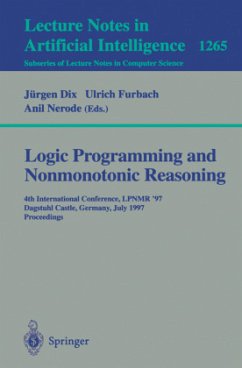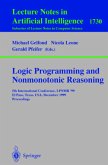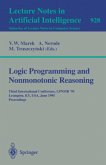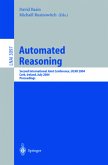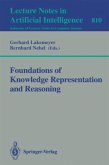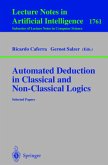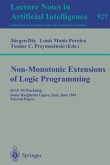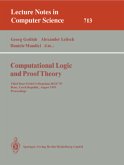DixFourth International Conference, LPNMR'97, Dagstuhl Castle, Germany, July 28-31, 1997, Proceedings
Logic Programming and Nonmonotonic Reasoning
Fourth International Conference, LPNMR'97, Dagstuhl Castle, Germany, July 28-31, 1997, Proceedings
Mitarbeit:Dix, Jürgen; Furbach, Ulrich; Nerode, Anil
DixFourth International Conference, LPNMR'97, Dagstuhl Castle, Germany, July 28-31, 1997, Proceedings
Logic Programming and Nonmonotonic Reasoning
Fourth International Conference, LPNMR'97, Dagstuhl Castle, Germany, July 28-31, 1997, Proceedings
Mitarbeit:Dix, Jürgen; Furbach, Ulrich; Nerode, Anil
- Broschiertes Buch
- Merkliste
- Auf die Merkliste
- Bewerten Bewerten
- Teilen
- Produkt teilen
- Produkterinnerung
- Produkterinnerung
This book constitutes the refereed proceedings of the 4th International Conference on Logic Programming and Nonmonotonic Reasoning, LPNMR '97, held in Dagstuhl Castle, Germany, in July 1997. The volume presents 19 revised regular papers together with 10 system descriptions and five abstracts of invited presentations. The papers included report state-of-the-art research and development in the interdisciplinary area of logic programming and logical foundations of artificial intelligence.
Andere Kunden interessierten sich auch für
![Logic Programming and Nonmonotonic Reasoning Logic Programming and Nonmonotonic Reasoning]() Michael Gelfond / Nicole Leone / Gerald Pfeifer (eds.)Logic Programming and Nonmonotonic Reasoning39,99 €
Michael Gelfond / Nicole Leone / Gerald Pfeifer (eds.)Logic Programming and Nonmonotonic Reasoning39,99 €![Logic Programming and Nonmonotonic Reasoning Logic Programming and Nonmonotonic Reasoning]() Logic Programming and Nonmonotonic Reasoning39,99 €
Logic Programming and Nonmonotonic Reasoning39,99 €![Automated Reasoning Automated Reasoning]() David Basin / Michael Rusinowitch (eds.)Automated Reasoning77,99 €
David Basin / Michael Rusinowitch (eds.)Automated Reasoning77,99 €![Foundations of Knowledge Representation and Reasoning Foundations of Knowledge Representation and Reasoning]() LakemeyerFoundations of Knowledge Representation and Reasoning39,99 €
LakemeyerFoundations of Knowledge Representation and Reasoning39,99 €![Automated Deduction in Classical and Non-Classical Logics Automated Deduction in Classical and Non-Classical Logics]() Ricardo Caferra / Gernot Salzer (eds.)Automated Deduction in Classical and Non-Classical Logics39,99 €
Ricardo Caferra / Gernot Salzer (eds.)Automated Deduction in Classical and Non-Classical Logics39,99 €![Non-Monotonic Extensions of Logic Programming Non-Monotonic Extensions of Logic Programming]() DixNon-Monotonic Extensions of Logic Programming39,99 €
DixNon-Monotonic Extensions of Logic Programming39,99 €![Computational Logic and Proof Theory Computational Logic and Proof Theory]() Computational Logic and Proof Theory39,99 €
Computational Logic and Proof Theory39,99 €-
-
-
This book constitutes the refereed proceedings of the 4th International Conference on Logic Programming and Nonmonotonic Reasoning, LPNMR '97, held in Dagstuhl Castle, Germany, in July 1997.
The volume presents 19 revised regular papers together with 10 system descriptions and five abstracts of invited presentations. The papers included report state-of-the-art research and development in the interdisciplinary area of logic programming and logical foundations of artificial intelligence.
The volume presents 19 revised regular papers together with 10 system descriptions and five abstracts of invited presentations. The papers included report state-of-the-art research and development in the interdisciplinary area of logic programming and logical foundations of artificial intelligence.
Produktdetails
- Produktdetails
- Lecture Notes in Computer Science 1265
- Verlag: Springer / Springer Berlin Heidelberg / Springer, Berlin
- Artikelnr. des Verlages: 10548903, 978-3-540-63255-9
- 1997.
- Seitenzahl: 472
- Erscheinungstermin: 2. Juli 1997
- Englisch
- Abmessung: 235mm x 155mm x 26mm
- Gewicht: 614g
- ISBN-13: 9783540632559
- ISBN-10: 3540632557
- Artikelnr.: 09213470
- Herstellerkennzeichnung
- Springer-Verlag GmbH
- Tiergartenstr. 17
- 69121 Heidelberg
- ProductSafety@springernature.com
- Lecture Notes in Computer Science 1265
- Verlag: Springer / Springer Berlin Heidelberg / Springer, Berlin
- Artikelnr. des Verlages: 10548903, 978-3-540-63255-9
- 1997.
- Seitenzahl: 472
- Erscheinungstermin: 2. Juli 1997
- Englisch
- Abmessung: 235mm x 155mm x 26mm
- Gewicht: 614g
- ISBN-13: 9783540632559
- ISBN-10: 3540632557
- Artikelnr.: 09213470
- Herstellerkennzeichnung
- Springer-Verlag GmbH
- Tiergartenstr. 17
- 69121 Heidelberg
- ProductSafety@springernature.com
Ulrich Furbach ist Professor für Künstliche Intelligenz an der Universität Koblenz-Landau. Seine Forschungsgebiete umfassen Automatisches Schließen, Agenten und Robotik sowie Frage-Antwort-Systeme. Er ist an der TU München habilitiert, an der Uni der Bundeswehr promoviert und ist Gründer und Gesellschafter des KI-Unternehmens wizAI.
Forward and backward chaining in constraint programming.- Strong and weak constraints in disjunctive datalog.- Nonmonotonic reasoning with quantified boolean constraints.- Improving the alternating fixpoint: The transformation approach.- Is non-monotonic reasoning always harder.- Complexity of only knowing: The prepositional case.- Affordable classes of normal logic programs.- Automated reasoning with nonmonotonic logics.- Simulations between programs as cellular automata.- Separating disbeliefs from beliefs in autoepistemic reasoning.- Power defaults (preliminary report).- A study of Przymusinski's static semantics.- Resolution for skeptical stable semantics.- Computing non-ground representations of stable models.- Industry needs for integrated information services.- Computing, solving, proving: A report on the Theorema project.- Towards a systematic approach to representing knowledge in declarative logic programming.- A paraconsistent semantics with contradiction support detection.- On conservative enforced updates.- A general framework for revising nonmonotonic theories.- Composing general logic programs.- Modular logic programming and generalized quantifiers.- Programs with universally quantified embedded implications.- Generalized query answering in disjunctive deductive databases: Procedural and nonmonotonic aspects.- DisLoP: Towards a disjunctive logic programming system.- REVISE: Logic programming and diagnosis.- A deductive system for non-monotonic reasoning.- The deductive database system LOLA.- ACLP: Flexible solutions to complex problems.- Nonmonotonic reasoning in FLORID.- GLUE: Opening the world to theorem provers.- Smodels - an implementation of the stable model and well-founded semantics for normal logic programs.- XSB: A system for efficientlycomputing well-founded semantics.- An implementation platform for query-answering in default logics: The XRay system, its implementation and evaluation.
Forward and backward chaining in constraint programming.- Strong and weak constraints in disjunctive datalog.- Nonmonotonic reasoning with quantified boolean constraints.- Improving the alternating fixpoint: The transformation approach.- Is non-monotonic reasoning always harder.- Complexity of only knowing: The prepositional case.- Affordable classes of normal logic programs.- Automated reasoning with nonmonotonic logics.- Simulations between programs as cellular automata.- Separating disbeliefs from beliefs in autoepistemic reasoning.- Power defaults (preliminary report).- A study of Przymusinski's static semantics.- Resolution for skeptical stable semantics.- Computing non-ground representations of stable models.- Industry needs for integrated information services.- Computing, solving, proving: A report on the Theorema project.- Towards a systematic approach to representing knowledge in declarative logic programming.- A paraconsistent semantics with contradiction support detection.- On conservative enforced updates.- A general framework for revising nonmonotonic theories.- Composing general logic programs.- Modular logic programming and generalized quantifiers.- Programs with universally quantified embedded implications.- Generalized query answering in disjunctive deductive databases: Procedural and nonmonotonic aspects.- DisLoP: Towards a disjunctive logic programming system.- REVISE: Logic programming and diagnosis.- A deductive system for non-monotonic reasoning.- The deductive database system LOLA.- ACLP: Flexible solutions to complex problems.- Nonmonotonic reasoning in FLORID.- GLUE: Opening the world to theorem provers.- Smodels - an implementation of the stable model and well-founded semantics for normal logic programs.- XSB: A system for efficientlycomputing well-founded semantics.- An implementation platform for query-answering in default logics: The XRay system, its implementation and evaluation.

